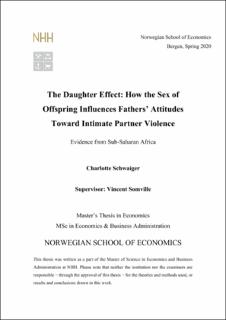The daughter effect : how the sex of offspring influences father’s attitudes toward intimate partner violence : evidence from Sub-Saharan Africa
Master thesis
Permanent lenke
https://hdl.handle.net/11250/2683675Utgivelsesdato
2020Metadata
Vis full innførselSamlinger
- Master Thesis [4372]
Sammendrag
Violence against women is to date one the most prevalent and destructive human right violations in the world (UN, 2020). Yet, our understanding of how violent attitudes are shaped and developed, is rather limited (Picon, et al., 2017). This thesis contributes to the literature by providing new insight on how the sex of offspring impacts sub-Saharan African father’s attitudes toward intimate partner violence. Using two-stage least squares regression analysis with time and country fixed effects, the relative effect of having daughters, compared to sons, on men’s justification of 15 separate acts of violation is estimated. The findings propose that fathers with daughters are significantly less justifying of physical violence, sexual assaults and controlling behaviour toward intimate partners. Specifically, conditional on the total number of children, men are 1.4 per cent less justifying of wife beating for every daughter they parent. Likewise, for every child being a daughter, fathers are 4.2 per cent less likely to consider either anger, refused financial support, rape or unfaithfulness as appropriate reactions if wife refuses to have sex. Fathers with daughters are also relatively more unlikely to believe that the man should have the final say on the making of large household purchases and number of children to have. The findings are consistent and statistically significant in 10 out of 15 attitude measures using single hypothesis testing, in 9 measures using the Romano-Wolf stepwise testing and in 8 measures using the Bonferroni-correction. Yet, the opposite case is only detected in 1 of 15 of measures. The findings propose that daughters have a relatively softening effect on the development of attitudes tolerant toward violence.
